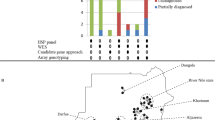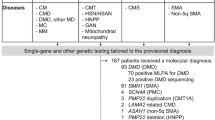Abstract
A follow-up nationwide survey on predictive genetic testing for late-onset neurological diseases in Japan was conducted. A questionnaire was sent to 89 institutional members of the Japan’s National Liaison Council for Clinical Sections of Medical Genetics, and was returned by 60 (67.4%). A total of 301 clients with an interest in predictive testing were accumulated from April 2006 to March 2011. The greatest interest was shown for spinocerebellar degeneration (SCD, n=110), followed by myotonic dystrophy type 1 (DM1, n=69), Huntington’s disease (HD, n=52) and familial amyloid polyneuropathy (FAP, n=35). The ratios of clients who actually underwent predictive testing were: SCD, 21.8%; DM1, 39.1%; HD, 26.9%; and FAP, 74.3%, indicating that predictive testing was conducted very cautiously for untreatable neurological diseases in Japan. Clinical geneticists were predominantly involved in genetic counseling, whereas the participation of non-medical doctor (non-MD) staff, including nurses, clinical psychologists and genetic counselors, was not common. Lack of non-MD counseling staff was one of the most serious issues in conducting predictive testing, which has not been improved since the previous survey performed in 2006. Institutional arrangements, such as revision of medical insurance system regarding genetic testing and counseling, might be necessary to resolve this issue.
Similar content being viewed by others
Log in or create a free account to read this content
Gain free access to this article, as well as selected content from this journal and more on nature.com
or
References
Yoshida, K., Wada, T., Sakurai, A., Wakui, K., Ikeda, S. & Fukushima, Y. Nationwide survey on predictive genetic testing for late-onset, incurable neurological diseases in Japan. J. Hum. Genet. 52, 675–679 (2007).
Mariotti, C., Ferruta, A., Gellera, C., Nespolo, C., Fancellu, R., Genitrini, S. et al. Predictive genetic tests in neurodegenerative disorders: a methodological approach integrating psychological counseling for at-risk individuals and referring clinicians. Eur. Neurol. 64, 33–41 (2010).
Cannella, M., Simonelli, M., D'alessio, C., Pierelli, F., Ruggieri, S. & Squitieri, F. Presymptomatic tests in Huntington's disease and dominant ataxias. Neurol. Sci. 22, 55–56 (2001).
Mandich, P., Jacopini, G., Di Maria, E., Sabbadini, G., Abbruzzese, G., Chimirri, F. et al. Predictive testing for Huntington's disease: ten years' experience in two Italian centres. Ital. J. Neurol. Sci. 19, 68–74 (1998).
Gargiulo, M., Lejeune, S., Tanguy, M. L., Lahlou-Laforet, K., Faudet, A., Cohen, D. et al. Long-term outcome of presymptomatic testing in Huntington disease. Eur. J. Hum. Genet. 17, 165–171 (2009).
Goizet, C., Lesca, G. & Durr, A. Presymptomatic testing in Huntington's disease and autosomal dominant cerebellar ataxias. Neurology 59, 1330–1336 (2002).
Bernhardt, C., Schwan, A. M., Kraus, P., Epplen, J. T. & Kunstmann, E. Decreasing uptake of predictive testing for Huntington's disease in a German centre: 12 years’ experience (1993–2004). Eur. J. Hum. Genet. 17, 295–300 (2009).
Maat-Kievit, A., Vegter-Van Der Vlis, M., Zoeteweij, M., Losekoot, M., Van Haeringen, A. & Roos, R. Paradox of a better test for Huntington's disease. J. Neurol. Neurosurg. Psychiatry. 69, 579–583 (2000).
Dufrasne, S., Roy, M., Galvez, M. & Rosenblatt, D. S. Experience over fifteen years with a protocol for predictive testing for Huntington disease. Mol. Genet. Metab. 102, 494–504 (2011).
Alonso, M. E., Ochoa, A., Sosa, A. L., Rodriguez, Y., Chavez, M., Boll, C. et al. Presymptomatic diagnosis in Huntington's disease: the Mexican experience. Genet. Test Mol. Biomarkers 13, 717–720 (2009).
Rodrigues, C. S., De Oliveira, V. Z., Camargo, G., Osorio, C. M., De Castilhos, R. M., Saraiva-Pereira, M. L. et al. Presymptomatic testing for neurogenetic diseases in Brazil: assessing who seeks and who follows through with testing. J. Genet. Couns. 21, 101–112 (2012).
Paneque, M., Lemos, C., Escalona, K., Prieto, L., Reynaldo, R., Velazquez, M. et al. Psychological follow-up of presymptomatic genetic testing for spinocerebellar ataxia type 2 (SCA2) in Cuba. J. Genet. Couns. 16, 469–479 (2007).
Takei, Y., Ikeda, S., Ikegami, T., Hashikura, Y., Miyagawa, S. & Ando, Y. Ten years of experience with liver transplantation for familial amyloid polyneuropathy in Japan: outcomes of living donor liver transplantations. Intern. Med. 44, 1151–1156 (2005).
Sekijima, Y., Dendle, M. A. & Kelly, J. W. Orally administered diflunisal stabilizes transthyretin against dissociation required for amyloidogenesis. Amyloid 13, 236–249 (2006).
Tojo, K., Sekijima, Y., Kelly, J. W. & Ikeda, S. I. Diflunisal stabilizes familial amyloid polyneuropathy-associated transthyretin variant tetramers in serum against dissociation required for amyloidogenesis. Neurosci. Res. 56, 441–449 (2006).
Acknowledgements
We are grateful to the respondents who participated in this study. This work was supported by a Grant-in-aid for Scientific Research (23591237 to YS), Health and Labour Sciences Research Grants for intractable diseases (12103066) and a Grant-in-Aid for Scientific Research (KAKENHI 23613004).
Author information
Authors and Affiliations
Corresponding author
Ethics declarations
Competing interests
The authors declare no conflicts of interest.
Rights and permissions
About this article
Cite this article
Tanaka, K., Sekijima, Y., Yoshida, K. et al. Follow-up nationwide survey on predictive genetic testing for late-onset hereditary neurological diseases in Japan. J Hum Genet 58, 560–563 (2013). https://doi.org/10.1038/jhg.2013.34
Received:
Revised:
Accepted:
Published:
Issue date:
DOI: https://doi.org/10.1038/jhg.2013.34
Keywords
This article is cited by
-
Precision management of gene-based tests not covered by the National Health Insurance system in Japan: a questionnaire-based study
Journal of Human Genetics (2022)
-
Genetic counseling and testing practices for late-onset neurodegenerative disease: a systematic review
Journal of Neurology (2022)



